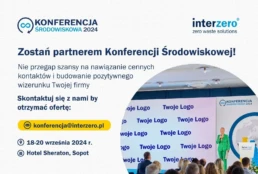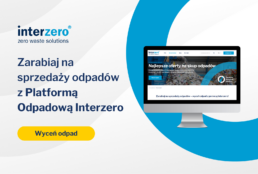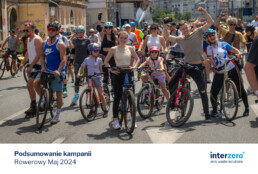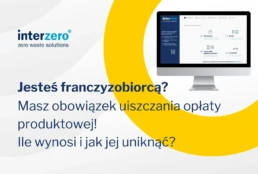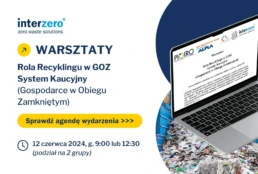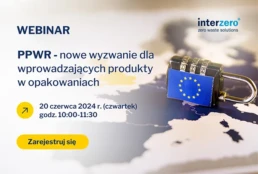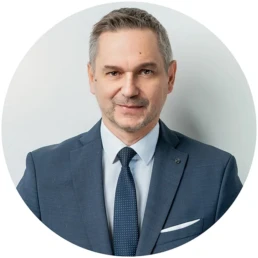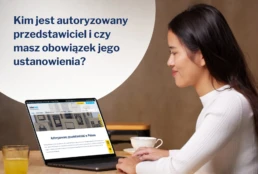Waste Valuation via Interzero Waste Platform - earn money by selling raw materials
Waste Valuation via Interzero Waste Platform - earn money by selling raw materials
The Interzero Waste Platform is a dedicated online system that enables comprehensive waste management in your company. With it, you can reduce waste management costs, automate waste records in BDO and increase revenues from the sale of raw materials.
The platform allows for automatic waste registration, planning of waste removals and generating waste removal notifications . This tool saves time and minimises potential errors in the system.
What is waste pricing?
Waste valuation at Interzero is a convenient solution that relieves you of the burden of searching for companies offering waste collection. It is also a way of earning money from raw materials. If you produce or store types of waste that are valued by recyclers, you can sell them for a profit, and at the same time save on waste disposal and logistics costs. The Interzero Waste Platform allows you to compare prices and choose the best offer .
Just fill out the form, provide the type and quantity of waste, and our specialists will contact you. You can also attach a photo of your waste if you have trouble determining the correct code!
The platform generates transparent cost reports, allowing you to quickly obtain the information you need. You can track revenues and costs related to transferred waste and municipal payments for municipal waste collection.
If you need more information, please visit the Interzero Waste Platform website .
Interzero as a partner of the Bicycle May campaign
Interzero as a partner of the Bike May campaign: we support sustainable mobility!
In 2024, Interzero was proud to announce its further involvement as a partner of the Bicycle May campaign. This initiative, which is the largest campaign in Poland promoting sustainable mobility among pre-school children, primary school pupils, teaching staff and parents and carers, fits perfectly with our company's objectives.
What is Bike May? Cycling May is a campaign that encourages the use of the bicycle as a means of transport to school. Through fun and gamification elements, the campaign teaches children and young people good habits that stay with them after the campaign. This reduces the number of cars transporting pupils and makes the area around schools safer and more cycle-friendly.
By supporting the Bike May campaign, we want to:
- Educate the public for sustainable mobility.
- Motivate children and young people to actively commute to schools and kindergartens.
- Together create a safe and cycle-friendly environment around educational establishments.
At the end of the Bike May campaign, a picnic was held where prizes were awarded to the most active participants. Interzero also organised eco spa and candle-making workshops. For the most active establishments, we also donated our EcoPaks, promoting green attitudes.
The Bike May campaign is not just about fun and stickers in bike log books. These are real actions that contribute to changing habits and improving the quality of life in our cities.
The next edition is less than a year away. Switch to a bike, encourage your children and pupils to commute actively and together we will change our cities for the better!
Check out the agenda for the Environmental Conference 2024 event!
Check out the agenda for the Environmental Conference 2024 event!
Interzero's Environmental Conference will already take place in Sopot on 18-20 September, where we will address the most important and up-to-date topics related to legislation, environmental protection and ESG.
This year's event will focus particularly on issues related to the legal changes dictated by the transposition of the EU SUP and PPWR directives, the introduction of a nationwide bail-in system in Poland from 2025, as well as sustainability models for business. The agenda features no shortage of speakers from brands in the Polish market, business organisations and the environmental industry. Read on to find out what else you will find in the Interzero 2024 Environmental Conference programme - full agenda available on the event page.
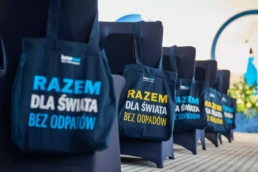
Bail system
As early as 2025, a deposit system will be in force in Poland, which will cover selected glass and plastic beverage packaging. This change poses quite a challenge for entrepreneurs, on whom obligations are imposed, including, among others, achieving a certain level of selective collection of packaging waste, keeping records or concluding an agreement with an entity representing in the deposit system. The Conference programme will include several lectures devoted strictly to the issue of the deposit system in Poland. Paweł Sosnowski, Plenipotentiary for Environmental Solutions at Interzero, will give a lecture entitled "Is a bail-in system without ROP a recipe for problems?", and Hanna Walczak, Implementation Manager at GS1 Poland, will talk about database standardisation in the lecture "Database for the bail-in system - what is worth knowing about it?". Also scheduled is a panel discussion "Deposit system - threat or opportunity for waste management?", which will include Interzero specialists, a representative of a trade network and an expert in the environmental industry with scientific and research achievements.
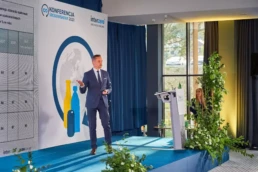
Interzero, together with the Polish Chamber of Packaging Recovery and Recycling, will set up an entity to represent entrepreneurs in the deposit system - learn more HERE.
Inextricably linked to this change is the EU PPWR (Packaging and Packaging Waste Regulation) directive, which sets top-down collection levels for packaging waste. The assumptions of this legislation will be outlined by Paweł Sosnowski in his lecture "PPWR, or new waste management solutions"; in the panel discussion "PPWR - how much will it cost us?" experts in the closed loop economy - including Piotr Mazurek from the Lewiatan Confederation and Robert Szyman, Director of the Polish Plastics Converters Association - will discuss the challenges of designing, producing and recycling packaging in the face of the new regulations.
Business sustainability
In addition to topics on the latest developments in national and European law, the Environmental Conference will discuss closed-loop economies, integrated environmental solutions, and sustainable business.
The circular flow of raw materials and products is an issue that will be of interest to all entrepreneurs who want to reduce their harmful impact on the environment and also reduce production costs. Speakers at this year's Environmental Conference will include experts from leading brands on the Polish market - including Wiktoria Płocha, Sustainability Business Partner at IKEA Retail with a talk on "Circularity - do we know where it starts?", Joanna Leoniewska-Gogola, Deputy Director Sustainability Consulting Central Europe at Deloitte Advisory, with a talk on "A company's circularity strategy in the context of the requirements of the CSRD non-financial report" or Jacek Płaza, Chief Sustainability Officer at Decathlon Poland with a talk on "How to reduce waste and develop new business models?".
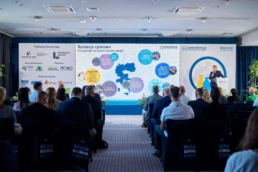
Mateusz Jemiol, producer and advertising director, as well as CEO of Mova Film, will talk about ESG from a marketing perspective in his lecture 'Can the subject of litter captivate the crowds? A recipe for an effective social campaign'.
Progressive technological development can go hand in hand with ecology - and this is thanks to digital tools to support waste management. In her talk, Aleksandra Mikiel, Operations Director at Interzero, will talk about Interzero Waste Platform - waste management tool.
Join the event today!
Would you like to become our partner?
Write to konferencja@interzero.pl
Summary of Open Day at Odra Cement Works
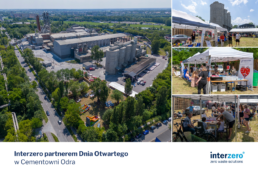
photo: Cementownia Odra
Summary of Open Day at Odra Cement Works
Cementownia Odra, the oldest operating facility of its kind in Poland, opens its gates to the general public once every two years. This year's event was unique, as it was organised for the first time since the pandemic. As in previous years, it attracted crowds of visitors, who had the opportunity to see the facility and explore the secrets of cement production, including technologies that minimise the plant's impact on the environment.
In his speech, Wojciech Putra, President of Cementownia Odra, emphasised that good neighbourliness requires trust, and the Open Day is an excellent opportunity to see for oneself what measures are being taken in the area of social and environmental responsibility.
Among other things, Opole residents learned that the cement production process is waste-free, while at the same time allowing the management of many difficult wastes such as:
- Fly ash (waste from power plant or thermal power station)
- Granulated blast furnace slag (waste from the steel industry)
- Reagips (waste from flue gas desulphurisation process)
- Copper slag (waste from copper smelters)
- Steel slags (by-product of the converter process)
- Alternative fuels (municipal and industrial waste)
Currently, 40% of the raw materials used in the production of Portland cements at the Oder Cement Works come from waste, and 60% of the energy is generated from alternative fuels.
In addition to the tour, the organisers provided a number of attractions, including performances by artists singing the greatest hits from the Opole Festival and a children's festival. In the children's zone, the Interzero stand was very popular, where visitors could playfully learn about the principles of correct waste segregation or prepare a small gift for their loved ones.
The Open Day at Cement Works Odra showed how this plant combines tradition with innovation and how it cares for the environment and the local community.
Interzero was one of the partners of the Open Day at the Oder Cement Works.
Franchise Product Fee | Pass on the obligation to Interzero
Franchisee Product Fee: How Much Is It and How to Avoid It?
Entrepreneurs running franchise outlets often offer their customers drinks and food in single-use takeaway packaging. Such packaging is subject to a recycling obligation or a product fee (in the event of failure to achieve the required level of recycling), which should be paid by the franchisee, not the franchisor. How much is the product fee and can the franchisee avoid it?
Division of responsibilities between franchisee and brand owner
Running a franchise outlet removes many responsibilities from the entrepreneur. The franchisee usually does not have to worry about, among other things, developing their own business model, designing new services, expanding the product portfolio or acquiring technical support and IT tools. These and other tasks specified in the agreement are usually performed by the franchise partner in exchange for periodic licence fees.
However, it should be remembered that the franchisor does not take over all the obligations of the franchisee - if you run a franchise point, you still have to fulfil, for example, environmental obligations resulting from the act on the management of packaging and packaging waste. One of them is the obligation to achieve the required level of recycling or pay a product fee for the introduced packaging.
Are you a franchisee? You are obliged to pay a product fee!
Every entrepreneur introducing products in packaging must take responsibility for the waste that is created from this packaging. It can do this in two ways: by ensuring the recycling of this waste or by paying a product fee for each kilogram of the unrealized level of recycling. Contrary to appearances, This obligation applies not only to producers, but also to franchises who sell drinks and food in takeaway packaging. .
If you run a franchise outlet where you sell, for example, coffee, meals or snacks in packages, the obligation to account for these packages rests with you, not the franchisor. This does not change even the fact that you sell all these products under the franchisor's brand.
In accordance with applicable law, every franchisee introducing packaged products must:
- ensure the recycling of packaging waste generated from them,
- pay a product fee (if the required recycling level is not achieved),
- conduct or finance public education campaigns.
These obligations result from the provisions of the Act on the management of packaging and packaging waste. According to the opinion from LEX Environmental Protection Law:
The entity running the gas station is responsible for the packaging of meals served at the station.
Source: https://www.prawo.pl/biznes/kto-ponosi-oplate-produktowa-za-opakowania-jedzenia-na-stacji,169823.html
Similarly, these regulations apply to companies running other franchise outlets and serving, for example, drinks in takeaway cups.
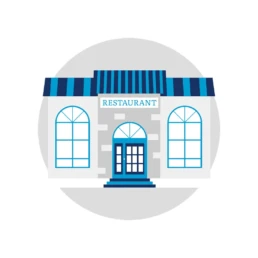
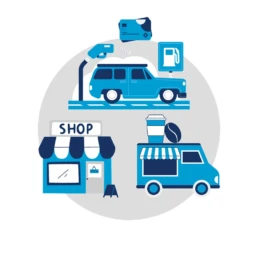
Does the mandatory product fee only apply to franchises?
NO. The obligations: recycling and paying the product fee apply to all entrepreneurs indicated in the act. However, our experience shows that it is the franchisees who are often unaware of their obligations . Many entrepreneurs running franchise outlets wrongly assume that recycling and the product fee remain with the franchisor, whose logo appears on all beverage and food packaging. Such ignorance often has unpleasant consequences - failure to meet environmental obligations results in the immediate necessity to pay a high product fee, and in some cases also in the imposition of a financial penalty.
Let us remind you: the obligation to ensure the recycling of packaging waste and pay the product fee may also apply to franchises operating:
- restaurants, pizzerias and other catering outlets,
- cafes (including mobile ones!), drink points (e.g. bubble tea),
- gas stations,
- shops,
- bakeries and confectioneries.
The above calculation is only an example - the mandatory product fee may also apply to other companies. It is also worth remembering that the act provides for a number of exemptions from the obligation to pay the product fee.
Want to check if the product fee also applies to you?
What packaging is covered by the product fee?
The product fee for packaging and packaged products is covered by among others all packaging used for takeaway food and drinks, e.g.:
- cups for drinks,
- cup lids and covers,
- dishes, e.g. plates, bowls,
- food containers (with or without lid): boxes, trays, boxes, buckets, paper packaging for popcorn or fries.
As a franchisee introducing products in packaging, you are required to keep records of this packaging, broken down by the type of material from which it was made. Such records are the basis for determining the amount of the product fee due, which is calculated based on the weight of the introduced packaging for which the entrepreneur has not achieved the statutory level of recovery and recycling.
Product fee amount - how much will the franchisee pay?
Individual packaging materials are subject to different product fee rates. In the case of the most popular types of takeaway food and drink packaging, the product fee rates are as follows:
- plastic packaging - PLN 2.70/kg,
- paper and cardboard packaging - PLN 0.70/kg,
- multi-material packaging - PLN 1.70/kg,
- wooden packaging - PLN 0.30/kg,
- other packages - PLN 1/kg.
Although the amounts for 1 kg of packaging are not very large, the sum of the product fee for the entire year often makes entrepreneurs dizzy . Importantly, the product fee for packaging can be avoided by fulfilling the recycling obligation. Each entrepreneur can do it on their own, ensuring recycling of 100% of the introduced packaging or with the help of the Interzero recovery organisation, without worrying about minimum recycling levels.

Pass on the responsibility to Interzero and avoid the product fee
Fulfilling environmental obligations is only a small fraction of all the challenges you face as an entrepreneur and franchisee. Fortunately, you can delegate some of your responsibilities to Interzero's environmental experts. This will save you not only time, but also money - for a small fee , we will take over your obligation to recycle packaging waste, and you will avoid a high product fee .
By entrusting your responsibility to Interzero, you will gain:
- fixed, low cost of taking over the obligation,
- the ability to conclude an online contract in 3 simple steps,
- official confirmation of the correct performance of the obligation for a given year,
- convenient access to documents related to the assumption of the obligation via the Moje Interzero portal,
- a certificate for your company and an annual report on the conduct of Public Education Campaigns.
Check how much you can save by transferring your recovery and recycling obligations to Interzero!
Workshop The Role of Recycling in the GOZ and the Operation of the Bail System
Workshop The Role of Recycling in the GOZ and the Operation of the Bail System
Join us for a unique workshop on the role of recycling in a Closed-loop Economy (SEE) and the operation of the deposit system. The meeting will be held 12 June 2024. at PRT Radomsko Sp. z o.o. (ul. Geodetów 8, 97-500 Radomsko).
The meeting is organised by Polish Chamber of Packaging Recovery and Recycling in cooperation with Interzero, the CPG Cluster, Ecokaucja S.A., the Foundation for Ecological and Educational Solutions "GREEN".
During the workshop, we will discuss key issues related to legislation, eco-design, recovery and recycling of packaging. We will then move from theory to the practical considerations of packaging waste management.
The workshop programme:
- Introductory presentation: "The impact of recycling on GOZ".
- Panel discussion: "Practical aspects of the Bail System".
- Visit to a PET bottle recycling plant: We learn about processing and the new life of plastic
Check out the full agenda for the event
The meeting is divided into two groups. The first group will meet at 9:00 a.m. and the second group will meet at 12:30 p.m. Each meeting will start with a discussion on legislation and practice in recycling in GOZ, followed by a tour of the PRT Radomsko plant and a live view of the PET bottle recycling facilities and process. Details of enrolment at the link.
You are welcome to attend free of charge! Places are limited, first come first served.
See you at the workshop!
Take part in the training course 'PPWR - a new challenge for packaging product introducers'.
Take part in the training course 'PPWR - a new challenge for packaging product introducers'.
There is growing environmental pressure on European Union countries to implement further measures to reduce the negative environmental impact of packaging. 24 April 2024 The European Parliament adopted the PPWR (Packaging and Packaging Waste Directive), which brings significant changes for entrepreneurs in the design, production and recycling of packaging.
The EU implements the rules not by way of a directive, but by way of a regulation. This means that the requirements will enter directly into the Polish legal order, without the need for time-consuming implementation as in the case of directives. It is time for a real packaging revolution and without unnecessary delays.
Who is affected by the changes?
Above all, producers of reusable and disposable packaging, recyclers and label manufacturers, as well as companies based in and importing into the EU.
It is worth finding out as soon as possible what changes await the Polish packaging market.
We would like to invite you to a webinar entitled "The world's most important events". "PPWR - a new challenge for packaging product introducers".which will already take place on 20 June 2024 (Thursday).
The online training will be led by: Pawel Sosnowski, Board representative for environmental regulation at Interzero
Scope of the webinar:
- Recyclability classes of packaging.
- Ecomodulation.
- Mandatory shares of recyclates in plastic packaging.
- Required proportion of reusable packaging.
- Adaptation of packaging volumes to the size of the products.
- Mandatory signage.
- Prohibition of certain packaging formats.
- Effective dates for the various obligations under the new legislation.
Registration for the webinar runs until: 20 June 2024 at 8:00 am.
You are welcome!
Become an official partner of the Interzero Environmental Conference!
Become an official partner of the Interzero Environmental Conference!
The 11th Edition of the Interzero Environmental Conference will be launched on 18 September at the Sheraton in Sopot! We warmly invite all those interested in promoting sustainable development to to cover the partnership our event.
Why become our partner?
- The Environmental Conference is an event that a wide range of pro-environmental topics (e.g. ESG, PPWR, GOZ, CSRD, CSR) attracts industry leaders, as well as expert companies and organisations related to the environment, recycling or sustainable development.
- By participating in the Conference you have the chance to make valuable business contactsas well as sharing experiences and gaining invaluable knowledge about the latest environmental trends, enabling you to build a more effective sustainable business strategy.
- As a partner an event focused on promoting sustainable development and integrated environmental solutions, build a green image for your company through real action to support the environment.
Would you like to find out more? Contact us at konferencja@interzero.plto receive an offer.
Details of the event available on the website of the Environmental Conference and on LinkedIn event.
Who is an authorised representative and who is required to appoint one?
Who is an authorised representative and who is required to appoint one?
Every entrepreneur placing electrical and electronic equipment on the market must comply with a number of obligations under the WEEE Act. Polish companies may do it themselves or through a recovery organisation. However, foreign companies may be obliged to establish in Poland authorised representativewho will perform the duties of introducer on their behalf.
Who appoints the authorised representative?
Manufacturers established in another EU Member State who:
- manufacture or market the equipment under their own name or trademark in the territory of the Member State concerned,
- resell under their own name or trademark equipment manufactured by others in the Member State,
- in the course of a commercial activity, equipment originating from a non-EU country or from another Member State is made available for distribution, consumption or use on the market of that Member State for the first time, whether in return for payment or free of charge
MAY appoint an authorised representative who will be responsible for carrying out, on the national territory, the obligations set out in the Act in relation to equipment placed on the market by that manufacturer.
In contrast, manufacturers established in another Member State or non-EU country and selling devices remotely in that country (e.g. via an online shop or sales platform) MUST establish an authorised representative.
As Interzero, we can take over your responsibilities under the Waste Electrical and Electronic Equipment Act. Our experts will get to know the specifics of your business and determine the type and status of your introductory duties, and then offer you the most favourable offer
For more information, please visit Authorised representative in Poland
Interzero Sustainability Magazine: shaping the circular economy
Interzero Sustainability Magazine: shaping the circular economy
As a leader in zero waste solutions, we are shaping the future of sustainability and the circular economy, as you will read in our latest Sustainability Magazine.
Guided by our vision of a 'world without waste', we are constantly working to turn this ambitious goal into reality. We continue to set new standards in the industry - from our innovative software Materialkontowhich provides full transparency and strategic access to processed raw materials, to the groundbreaking PET recycling plant in Liebenau. These successes are underlined by the prestigious German Sustainability Award 2024, which Interzero received in the category 'Waste Management and Recycling Industry', recognising our transformative work in waste management and resource conservation. We believe that our approach can be a source of inspiration - proving that environmental responsibility and economic prosperity can go hand in hand.
Our activities go beyond recycling; we actively collaborate with manufacturers (CLASSEN Group) or fashion brands (Marc Cain) to implement sustainable practices in various industries. Our initiatives, such as the 'We want Moor' campaign and our partnership with COREPLA for the RecoPet project in Italy, demonstrate our commitment to addressing environmental issues on many fronts. By investing in education through the International Zero Waste Academy and engaging in projects such as chemical recycling, we foster a culture of sustainability that encourages innovation and collaboration. As leaders in environmental stewardship, our holistic approach and tangible contributions are pushing the boundaries towards a more sustainable and cyclical future.
Read the whole HERE.
